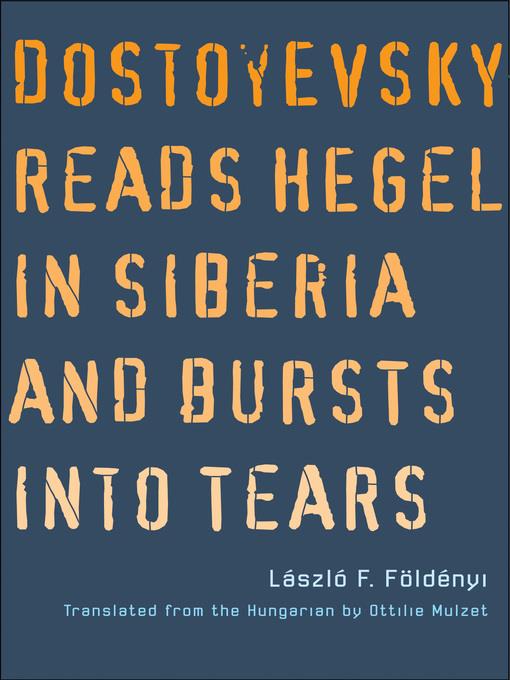
Dostoyevsky Reads Hegel in Siberia and Bursts into Tears
The Margellos World Republic of Letters
کتاب های مرتبط
- اطلاعات
- نقد و بررسی
- دیدگاه کاربران
نقد و بررسی

December 23, 2019
In this eclectic essay collection, art theory professor Földényi (Melancholy) takes readers on an elegant but hard-going philosophical tour. His main premise is that, ever since the 18th-century Enlightenment, humans have vainly tried to dispel the “darkness” and “inscrutability” that inevitably coexist with light and reason in the human condition. In the title essay, he finds humanity both outwardly self-satisfied and inwardly anxiety-ridden. In Földényi’s worldview, the irrationality that Enlightenment thinking seeks to repel always lurks in the shadow. In an analysis of Francisco Goya’s “The sleep of reason produces monsters,” Földényi concludes that though the etching’s sleeping figure might wake “to do battle” with the monsters surrounding him, he could just as easily arise from his “troubled dreams” transformed, like Kafka’s Gregor Samsa, into a monster himself. Here, as elsewhere, Földényi shows a knack for making surprising connections between different works of art. However, though the marvelously evocative title may draw in casual literature fans, they are likely to lose interest after discovering the book is less concerned with the lives of famous writers than with Földényi’s own ruminations. This rather opaque treatise will be best appreciated by those just as well-steeped in European intellectual history as Földényi himself.

December 15, 2019
A collection of essays on why contemporary culture would do well to embrace transcendence. Hungarian cultural critic Földényi (Theory of Art/Univ. of Theatre, Film, and Television, Budapest; The Glance of the Medusa: The Physiognomy of Mysticism, 2018, etc.) gathers 13 pieces, published in earlier versions from 1995 to 2012, that examine the spiritual and metaphysical consequences of the Enlightenment. The author regrets the loss of mystery in contemporary life, "the feeling that there is something incomparably greater than my own self." That sense of the ineffable, he asserts, was suppressed during the Enlightenment, which promoted the idea that "only time and intellectual preparation were required in order to cast light upon all things--with no dark corners remaining anywhere unilluminated by the light of reason." In essays that consider a wide range of writers and artists, including Dostoyevsky, Rilke, Goethe, Artaud, William Blake, Mary Shelley, Goya, and many more, Földényi underscores the importance of the metaphysical and warns against seeing "the renunciation of transcendence as a victory." We are surrounded by the enigma of our own existence: "Each human life," the author writes, "emerges thanks to a fracture, a break" that plunges us from nonexistence into existence and throws us back again. In the title essay, the author imagines Dostoyevsky, exiled in Siberia, coming upon Hegel's rationalistic philosophy of world history, which eliminated Siberia "as a setting for historical culture." Exiled from the rest of Russia and now, by Hegel, from the progress of world history, Dostoyevsky responded at first with dismay. But gradually, he came to find new understanding--of himself, religion, and the Russian soul--far from "Hegelian repression." Among Földényi's essays on art, his consideration of Caspar David Friedrich's painting Wanderer Above the Sea of Fog stands out for its precise, lyrical prose and insights about art and science. Friedrich's painting, the author argues, reflects the contradictory longing of German romantics to become eternally submerged in nature--or to turn around and "write rapturous interpretations of the absolute spirit embodied by that sea of fog." Perceptive meditations on humanity's need for spiritual nourishment.
COPYRIGHT(2019) Kirkus Reviews, ALL RIGHTS RESERVED.

























دیدگاه کاربران